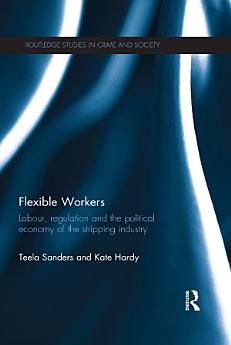Flexible Workers: Labour, Regulation and the Political Economy of the Stripping Industry
About this ebook
The book explores the reasons for the expansion of the industry in the United Kingdom and the experiences, opinions and perspectives of those that produce and shape it. Placing dancers' voices centre stage, it examines the wider political economy which shapes dancers' engagement in employment in the stripping industry, pointing towards the wider conditions of the labour market and growing privatisation of Higher Education as explanatory factors for its labour supply. In suggesting a new feminist politics of stripping, dancers voice their own political awareness of erotic dance and an intersectional analysis of solidarity with workers in the stripping industry is foregrounded.
Presenting a 360 degree view of the industry, this ground-breaking study presents systematic evidence for the first time on this area of social life which has become central as a strategy of survival, class mobility and urban accumulation. It will appeal to undergraduate and postgraduate students across the fields of criminology, sociology, geography, labour studies and gender studies, as well as regulators, activists and even dancers themselves.
About the author
Teela Sanders is Reader in sociology at the University of Leeds with qualifications in both sociology and social work. Working at the intersections of sociology, criminology and social policy, she has published extensively in areas germane to sexuality/gender and regulation. Monographs to date include: Sex Work. A Risky Business (Cullompton: Willan 2005), Paying for Pleasure: Men who Buy Sex, (Cullompton: Willan, 2008). Co-authored texts include Prostitution: Sex Work, Policy and Practice (Sage, 2009). She has co-edited, New Sociologies of Sex Work (Ashgate, 2010), Body/Sex/Work – intimate, embodied and sexualised labour (Palgrave, 2013) and Social Policies and Social Control: New Perspectives on the Not-so-Big Society (Policy Press, 2014).
Kate Hardy is a Lecturer in Work and Employment Relations at the Leeds University Business School. Her research explores a feminist political economy of labour, with a particular focus on non-standard forms of work and the intersections between paid and non-paid forms of labour, work, employment and the body. Her research and scholarship is informed by a commitment to social change and a desire to bridge academia and activism through involvement in the feminist movement and other spaces of political activity. She has co-edited Body/Sex/Work – intimate, embodied and sexualised labour (Palgrave, 2013) and New Sociologies of Sex Work (Ashgate, 2010) and has articles in a number of journals, including the British Journal of Sociology, Work, Employment and Society and Emotion, Space and Society.






